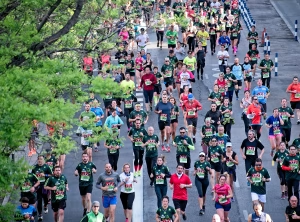Exercise
To Morning Exercise or Not to Morning Exercise

Patients (and students) can be good teachers, and one recently reminded me of an important premise, as she reported feeling much better since beginning to exercise in the morning upon waking, before breakfast, before doing anything else. For her, this made sense. For approximately the other half of the population it would not.
Sunrise in Chinese medicine is Shao Yang time, the time of day that corresponds, logically, with the body’s pivot, that is the system whose responsibility it is to use cortisol to bring vital substances, such as immunological or hormonal, upwards in the body. For those of us whose cortisol spikes too quickly or too early, exercise is one way to temper this surge. Interestingly, healthy food is another way. While physical movement can clear some of the inflammatory heat associated with morning cortisol, a proper breakfast of protein, unrefined sugars, and/or healthy fats can also act as an anchor to prevent it from spiking so much in the first place. For the types of people more prone to insomnia, hyperactivity, and fast metabolisms, it seems a moderate morning workout shortly followed by breakfast might be ideal.
For the opposite body type, prone to hypersomnia, chronic fatigue, and/or weight gain, a better time to exercise might be the time of day associated with the most “yang qi,” or warmth, closer to 12 noon, as these people tend to be more lacking in cortisol, as well as other excitatory chemicals, and therefore will benefit more by moving in accord with the environmental nature around them.
For those of us with small children at home, who cannot exercise upon waking, or those with jobs that preclude us from exercising just before lunch, I recommend doing what you can. Everyone is busy, but if you can find 15-30 minutes/day to get in your preferred form of movement, almost every scientific study on the subject since the beginning of scientific studies corroborate the benefit.
Acupuncture Post-NYC Marathon

The NYC marathon was this past weekend, and approximately 55,000 people pursued an admirable goal, reached a self-defined mountaintop, and in the process may have caused some degree of irreparable damage to their knees and/or hearts.
Although running is not the most advisable form of exercise in Chinese medicine, it is my opinion that for most people in moderation its benefits outweigh its pitfalls, helping to improve stamina and cardiovascular health, promote circulation, and in most months out of the year a healthy, non-excessive amount of perspiration.
But just like too much perspiration ends up negating its benefit by leaching the anti-inflammatory molecules and neurotransmitters contained within it, too much running can cause more harm than good—excess sweat being just one form of it.
While I struggle to disidentify as anything but a metropolitan, I also know that humans were not intended to walk, let alone run, on cement. That concrete is an inorganic, manmade endeavor, a luxury but challenge of modern society—good for capitalism, bad for Daoism.
Repeated pounding on the knees depletes their synovial fluid, the cushioning between bones and lubrication around tendons and ligaments that keep them soft, pliable, protected. Two ways to mitigate this effect is through stretching, that is opening the vessels and collaterals that send fluids to the patellae, but also with treatment.
Local acupuncture where fluid is missing cannot offer very much, but local moxibustion can inhibit NF-kappa B (inflammatory) signaling pathways, thereby dilating local vessels enough to attract white blood cells and healthy fluids. What’s more, “sports medicine” treatment around the neuromuscular paths that surround the knees can have a similar effect. Rectus femoris, biceps femoris, vastus medialis and laterali—basically, invigorate the thighs to unburden the bones.
As for the heart, this is obviously a serious issue. Excess exercise is arguably just as hard on the body as no exercise. It is important that we all find our own unique sweet spot in the middle and engage with discipline each week. For the excess inflammatory type, who drips with sweat, whose face turns red during workouts, who over-indulges and over-extends, the best recovery formula after a marathon will likely be Bai Hu Jia Ren Shen Tang, or White Tiger and Ginseng Decoction, with gypsum stone to clear the inflammatory heat that can overstimulate the heart, plus ginseng, licorice, and that’s right, white rice, to prevent further heat from flaring.
For the more typical runner type, thin and pale, who gets easily cold and prone to getting sick or injured, a potential recovery formula is Gui Zhi jia Gui Tang, or Cinnamon Twig Decoction with licorice, ginger, red dates, and extra cinnamon to strengthen and warm the chest.
Wishing everyone a speedy recovery, whether from the madness of marathon running or that of trick-or-treating. Stay warm and take care, especially en route to the holidays!
The 4 Seasons of Each Day
 While many people are preoccupied with what foods are good for them, what foods are “bad,” and which exercise is ideal, from a Chinese medical perspective it is easier to simplify: The more we live according to the Dao (the scientific way of nature), the less ailments we will have. The less we live with the Dao, the more ailments we will have.
While many people are preoccupied with what foods are good for them, what foods are “bad,” and which exercise is ideal, from a Chinese medical perspective it is easier to simplify: The more we live according to the Dao (the scientific way of nature), the less ailments we will have. The less we live with the Dao, the more ailments we will have.
One Daoist, and subsequently Chinese medical principle is that each individual day contains within it the same seasonal arc that we experience in each year. Obviously, this does not mean that every day in January and February around 12 noon the temperature visits 80 degrees (though wouldn’t that be nice? But confusing). The arc is relative.
The morning hours correspond with the mechanisms and principles of spring. Rise and shine. “Plant seeds” for the day, in the form of a healthy breakfast and possibly setting one’s intentions. If you truly don’t have time for a good breakfast during the week, try to have an earlier lunch and be sure to do so on weekends. Morning is a good time for exercise, but not as ideal as mid-day, nicknamed “Tai Yang,” most yang and/or high noon.
Mid-day corresponds with summer. It is when most people have the most energy, hence it is the time to be most physically active. Since Chinese medicine views most parts of the body from a “use it or lose it” perspective, the less disciplined we are about engaging in at least some movement during the Tai Yang hours (11am-3pm), the weaker we will become. Again, if this is challenging during the work week, I recommend finding and committing to 15-minute windows, then “realer” workouts on weekends.
Sunset to nighttime obviously equates with autumn and winter, hence regenerating and restoring, winding down until sleep. This parallel is the one with an apparent hole in logic, as we recommend eating more calories in the winter than summer, but more during the day than at night when the body is relatively more insulin resistant. My understanding is the premise is more applicable to activity than caloric consumption, and principles of relativity still apply. Eat smaller meals for dinner in summer than in winter and remain restful at this time during all seasons. If you enjoy going out and indulging with friends once or twice a week or once or twice a month, by all means do so, but follow a more Daoist schedule on all other days.
In my opinion, there is actually virtue to a lot of “gimmick diets,” abstinences, and new age health regiments. However, in thousands of years, neither the human body nor nature has changed very much. If it had our medicine would be rendered wholly ineffective. Follow the Dao.
Go to sleep at a healthy bedtime, eat a healthy breakfast, exercise at mid-day.
Eat cooler foods and less foods in summer—warmer and more foods in winter.
Minimize indulgences, stress, and reductionist medicines.
These Longest Days of the Year

Welcome to the Tai Yang time of year. Say that three times fast, and maybe add “Thank You,” to complete the trifecta, TYTYTY! “Tai Yang” means the most yang, as we enter the longest days of the year, leading up to the summer solstice next week, at which time days will begin to very gradually, grow shorter.
Until that time we might be more vulnerable to “yang pathogens,” exemplified by inflammatory heat and/or “external invasions,” which is probably why we see a minor uptick in Covid cases around this time each year, despite the warm weather which should mitigate such spread. More common are the former, symptoms of “heat rising,” a la insomnia, anxiety, palpitations, acid reflux, constipation, headaches, and ANGER!!! If you’ve noticed an exacerbation in any such signs within yourself, rest assured, it is normal for the time of year and relatively wane after June 21st. If it doesn’t, see a doctor, and/or myself.
Some of the things we can do to cool excessive yang rising include green tea in the mornings (after breakfast), then peppermint or chrysanthemum teas at night, snacking on watermelon, cucumbers, and celery, and minimizing spicy foods and alcohol. Most importantly, sweat!
In Chinese medicine we treat most “Tai Yang disease,” or viral pathogens through moderate sweating—underscore moderate for you high intensity athletes—and as the weather now is increasingly humid to begin with, it is important to sweat, just a bit every day.
The Tai Yang time of day is mid-day, around noon, which makes that window optimum for exercise—although as I often advise my busy patients, the truly best time to exercise is whenever you have time. ‘Tis better to do imperfectly than not do at all.
Although I am admittedly a slave to air conditioning for sleep, it is obviously manmade, unnatural, and ultimately not physiologically (or environmentally) beneficial. In the humid climate of summer, the contrived cold air traps pathogenic fluids at the exterior, or “Tai Yang layer” of the body, thereby exacerbating local inflammation, often inducing skin/joint conditions, and compromising immune function. I recommend using it as minimally as possible and/or wearing a scarf or long-sleeves while in offices or public transportation that insist on killing us slowly. And spend as much time outdoors as possible. We are all too deprived of it these days.
Happy Father’s Day!
Can It Be All Stress?
 “It’s just stress,” is a diagnostic platitude commonly heard by patients when relaying either to friends or their doctor about some odd or non-immediately fatal symptom that lacks any conventional, empirical treatment.
“It’s just stress,” is a diagnostic platitude commonly heard by patients when relaying either to friends or their doctor about some odd or non-immediately fatal symptom that lacks any conventional, empirical treatment.
It would be an over-simplification to label this stock response as wholly or always dismissive—in my opinion it is more often a result of the listeners’ lack of knowledge of physiological nuances, disease spectrums, and of course the entire internal paradigm of Chinese Medicine.
The mind is en vogue in the past generation, so much so that people jump at the opportunity to sound mentally acute even while being mentally lazy in its default citation as a scapegoat for everything, the way fat was in the 20th century or sugar is now. It makes them feel aware of the more mysterious, all while maintaining an orthodox adherence to conventional medicine’s present understanding of things. I picture people picturing themselves as if sipping a small cup of whiskey wearing Coke bottle glasses and a bowtie in their reply: “It’s (probably just stress),” then putting their cup back down and nodding their head as if they’d just cured HIV.
While no one could dispute that stress is an important variable in the etiology of most illnesses, it is also just that: One important variable. So why when we have curious symptoms that conventional medicine has no explanation or treatment for do they never say: “It’s just diet?” “It’s just your sleep hygiene?” Or: “It’s just your exercise routine that needs refinement or reduction, or simply needs to exist?”
Why when one person experiences incredible stress does it show up as digestive issues, while for another it does as insomnia, and another as hives all over their skin? “People are different,” idiots might shrug and say, which isn’t untrue, but is an egregious oversimplification. People are different, which means if we each consumed diets and partook in exercises suitable to our own individual constitutions, we’d likely be able to ward off the ill effects of short or even medium-term life stressors.
If stress causes you low back or neck pain we know there is “dampness trapped on the exterior layer of the body.” If stress causes stomach issues we know there are already stomach issues, since most or many people can endure stress without such symptoms. If stress causes headaches or migraines then there was likely already some dysregulation of cerebrovascular flow in particular neurological pathways
In this way stress can be invaluably informative, by tipping our internal scale and showing us where we are weak, where in our bodies we are retaining pathogenic fluids, so we can properly treat, instead of dismissing it. Because odd, inexplicable symptoms are never nothing. They are not “all in our minds” or insignificant. Instead, from a Chinese Medical perspective, sadly they are potential coming attractions—foreshadows of diagnoses to come.
I apologize if this sounds dark or ominous. My intention is the opposite, to offer optimism and agency to those of us who have been repeatedly implied to that we must resolve all of our internal turmoil in order to be free of a particular problem. While I am all for a daily practice of meditation, prayer, community, and anything else that reduces stress, we should be able to also rely on medical providers to step in with something more to offer during periods where our practice of psycho-emotional work and discipline just is not enough.


